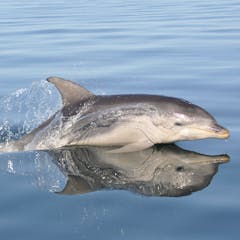
Articles on Marine pollution
Displaying 1 - 20 of 37 articles

Banning single-use plastics in Nigeria is a step in the right direction. But its success will depend on provisions made for enforcement.

Researchers are finding alarming concentrations of persistent pollutants such as PFAS in Australian dolphins. These record-breaking levels are cause for concern.

Initiating a circular economy can help coastal west African countries to address plastic pollution with a World Bank fund.

No place on Earth is free from pollution.

Every year, it’s estimated as many as 24,000 fishers die in fishing vessel accidents. That’s more than 10 times more lives claimed than on merchant ships, carrying cargo or passengers. Why?

The plastic industry uses powerful tactics to convince us it’s not that bad, but in reality many of their green solutions aren’t working.

Nigeria generates 2.5 million tonnes of plastic waste yearly. Research and public enlightenment can help address the problem.

When humans eat fish, mussels and other foods containing antibiotics, the residual antibiotics may cause bacterial pathogens to become resistant.

Technology and regulation have solved some issues with bycatch. To reduce damage to marine life further, we can harness the skills of our best fishers.

Clean-up operations after a spill can miss large quantities of the oil, with severe risks for marine habitats, fish and birds.

New research points to ‘heavy metals’ having unseen effects on a much larger scale than previously thought.

This year’s national conference of the Australian Marine Science Association is a plastic-free zone, as marine scientists aim to reduce the environmental burden of throwaway plastic.

Without action, the amount of plastic waste produced globally could reach as much as 265 million tonnes per year by 2060.

Nurdles are a raw feedstock used to make most of the plastic products we use everyday, but they’re flooding the ocean as “mermaid tears”.

Autopsies of 1,000 turtles washed up on Australian beaches paint a grim picture of the impact of plastic debris. Even a single piece can be deadly, and on average 14 pieces equals a 50% fatality rate.

If we are truly invested in addressing the issue of marine plastic and offsetting the potential harms, we have to understand which fish eat plastic and which ones don’t.

In the wake of a norovirus outbreak traced to raw oysters from British Columbia, our expert explains how to eat this culinary delicacy safely.

The federal government’s new $500 million funding package for the Great Barrier Reef seems predominantly focused on the tactics that are already being tried, without much success.

Plastics and microplastics in the marine environment are one of the great cause célèbre of our era. Here’s what we know and don’t know.

An ambitious plan to cut the flow of nutrients into the Chesapeake Bay has produced historic regrowth of underwater seagrasses. These results offer hope for other polluted water bodies.
